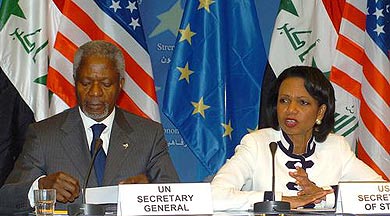While occupation forces cannot control the situation in Iraq, more than 80 countries and intergovernmental organizations met in Brussels on June 21st and 22nd , 2005, to reiterate their support for the operation led by the Coalition against Iraq, which was later approved in Resolution 1546. The meeting was aimed at showing the American public opinion that, contrary to what happened for the case of Viet-Nam, Washington is not alone in Iraq. Therefore, the bad news coming from this country are irrelevant.

As a request made by the Iraqi government, the United States and the European Union held in Brussels on June 21st and 22nd , 2005, an international conference about Iraq in which more than 80 countries and intergovernmental organizations participated and unanimously adopted a common declaration supporting Security Council Resolution 1546. All delegations expressed their optimism and in her closing speech, American Secretary of State Condoleezza Rice congratulated the Iraqi Transitional Government and offered the “Full and wholeheartedl support” of the international community.
However, if we choose not to follow the press releases and other documents previously written by tolerant reporters, we will notice the conference had nothing to do with the aid the Iraqi people needs but with the aid the American government needs for it is in the middle of a war it can not win.
Apart from the speeches of the Iraqi delegation which was led by Prime Minister Ibrahim A. Al-Jafaari, other participants’ addresses lasted no more than five minutes. It was a long list of speeches aimed at recognizing the courage of the Iraqi people and congratulating the Iraqi government for its election.
Condoleezza Rice wanted all participants to say the election had been democratic. However, she had no choice but to be pleased with the recognition of the “results of the ballot” for the selection of the candidates under the control of the occupying forces did not fool anybody.
Nevertheless, Lavrov, the head of the Russian diplomacy, wanted everybody to say the future of Iraq should not be under the absolute control of the Coalition. During the Sharm-el-Sheik Summit in 2004, he succeeded in forcing the US to vaguely recognize part of the role of the UN. On the other hand, he conditioned his participation in the Brussels Conference to the inclusion of the Sunnites in the drafting of the constitution despite having been marginalized from the National Assembly in a fraudulent way.
The European Council presented one of its typical documents: a meaningless three-page text. The important thing was it included a phrase which condemned the actions of the resistance against the collaborators and the Coalition troops: “Participants firmly condemned all acts of terrorism, (...) as well as acts of violence against the Iraqi authorities and those who contribute to the stability of Iraq”. Nobody felt questioned, not even those who send the state-of-the-art weapons to the resistance.
In his opening speech, Jean Asselborn, from Luxembourg and current president of the European Council on Foreign Relations did talk about the: “the rejection he feels for the terrorist attacks which relentlessly harm the Iraqi people”. On his part, sort of off the record Javier Solana, High Representative for the Common Foreign and Security Policy of the European Union said how pleased he was with the role of the European Union in the formation of Iraqi judges and policemen as well as with NATO’s contribution, an organization he represented as its General Secretary.
UN Secretary General, Kofi Annan, who has already forgotten his own statements on the illegal character of the war against Iraq, delivered another sermon aimed at urging the international community to show its solidarity with the Iraqi people.

The interesting thing was that all speeches evidenced a previously negotiated consensus: everybody had agreed to use and say ambiguous statements to lead people to think a substantial agreement had been reached.
– The political process must include all Iraqi factors;
– It must include the legitimate demands of the States of the region;
– It must include the point of view of the international community.
However, labeling the resistance as “terrorists” was enough not to include it; accusing Syria and Iran of supporting the “terrorists” was enough not to consider the legitimate demands of these two states; with regard to the international community, it’s asked to submit itself.
The conference was not aimed at making decisions. But due to the fact that the main players were there, some were made. The members of the WTO promised to support the adhesion of Iraq to the organization, and those of the Security Council urged the UN to give the Iraqi Treasury what’s left of the budget of the inspection missions.
Later, Jean Asselborn presented the Final Declaration everybody knew. He asked delegations if could count on their consent and without knowing their reaction he put an end to the meeting. Then, they agreed to meet again in the Donors Conference between July 18 and 19 in Amman. Undoubtedly, broken promises already made in Madrid in 2003 and Tokyo in 2004 will be reiterated there. These meetings do not mean much to the Iraqi people but they allow George W. Bush to maintain his “democratization” discourse presenting Washington as the Good that acts in agreement with its allies. Thus, the international diplomacy serves the interests of the president of the United States who, satisfied with this formal support, will certainly give an important speech on the reestablished freedom of Iraq.
titre documents joints
AGCS : 160 secteurs de services
(MPEG - 18.7 KiB)
AGCS : Le texte de référence, en annexe de la création de l’OMC (ou Accords de Marrakech)
14 décembre 1994
(Flash - 89.2 KiB)





















Stay In Touch
Follow us on social networks
Subscribe to weekly newsletter